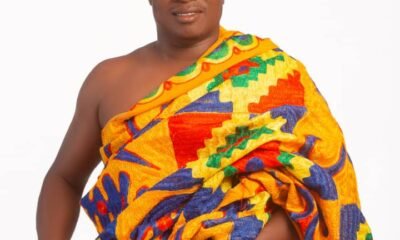News
Superstition at K’dua Market …traders reject smaller denomination

Money
In the busy markets of Koforidua, a unique tradition has taken root among some traders.
As they set up their stalls each morning, a number of these vendors refuse to accept smaller currency denominations.
It is the belief of these group of traders that starting the day with such small transactions would affect sales and not make any profit.
This superstition, shared by traders in other markets throughout the region, has become a habitual practice that influenced their customer interactions and financial management, particularly in the early hours of trading.
For these traders, whether the day would be profitable or not depends on the first transaction. If the initial transaction involved smaller denominations, they feared it would set a negative trend for the day, leading to insufficient earnings.
To avoid this perceived misfortune, they turn away customers offering smaller bills or coins, preferring to wait for those with bigger denominations.
Madam Phyllis Boateng, a trader who believes in this superstition, explained to The Spectator that while the practice might seem irrational to outsiders, she firmly believes in the spiritual implications of money.
“We don’t only engage in commercial sales; we also believe that money has spiritual effects, and your small amount can negatively affect my sales. Some customers might feel offended, but I think they can find alternative shops to buy from,” she said.
Aside the belief about the size of denominations, Madam Priscilla Zilevu, another trader, has taken additional measures to also protect herself from bad luck.
She mixes garlic and pepper with her money, believing that this would ward off negative effects on her sales.
“Sometimes the source of the money the customer is using to buy from you is not a good one and can drain you financially, so you have to protect yourself from some of these things,” she explained.
Not all traders share this belief though as Dora Appiah-Kubi, who does not believe in these, recounted her experiences with other traders who refuse small denominations for their first sales.
Even taxi drivers, she noted, sometimes refuse exact fares like GH¢4.50 when starting their day, preferring larger notes.
However, a local preacher, Pastor John Amponsah, in Koforidua, Densuano, said the belief was fascinating, emphasising that the Bible does not support such practices.
“Even though many describes money as spirit and the trader not knowing the source of it, I believe it is more about how that money was used,” he said.
Pastor Amponsah said some Christian traders adhere to this superstition and pointed out that there was no biblical basis for the position of the market women.
Instead, he advised traders to accept all kinds of denomination and pray over them, citing Proverbs 10:22: “The Blessing of the Lord maketh rich, and he addeth no sorrow,” and the story of Jesus commending the woman who gave the least offering as examples to follow.
He urged traders to abandon this practice, accept all forms of currency, and place their faith in God’s provision, rather than succumbing to superstitious fears.
From Ama Tekyiwaa Ampadu Agyeman
News
Reconstruction of Sunyani-Techiman-Wenchi-Wa-Hamile Road Corridor to Begin Under “Big Push” Initiative

The reconstruction of the Sunyani-Techiman-Wenchi-Wa-Hamile road corridor is set to begin in the third quarter of this year as part of the government’s “Big Push” initiative,
Kwame Agbodza, the Minister for Roads and Highways, has announced.
To this end, the Minister has directed the Ghana Highways Authority to conduct engineering studies and designs for sections of the corridor that are not currently under construction, in preparation for the upcoming work.
“This entire corridor, all the way to Hamle, is part of the ‘Big Push’ initiative. It is one of the “Big Push” projects we aim to award in June this year. Therefore, those involved in the studies and designs need to expedite their work. We don’t have enough time,” he stated.
Mr. Agbodza made these remarks this morning in Sunyani, at the start of a three-day inspection tour of the Bono, Bono East, Ahafo, and Western Regions.
The Minister indicated that government is aware of the socio-economic importance of roads towards national development, which is why road infrastructure development is being prioritized despite the financial constraints facing the country.
“No matter what we want to achieve—whether in farming, education, or healthcare—roads are critical. Our economic development cannot take shape if we do not address the challenges in the road sector,” he stressed.
Earlier, Me. Agbodza and his team of Engineers inspected the 10.20km Terchire bypass located off the Kumasi-Sunyani Highway constructed by Newmont Ghana.
During the tour, Hon. Agbodza is also expected to inspect several other road projects, including the reconstruction of the Jinijini-Sampa Road, the Tepa-Goso road, the Sefwi Wiawso town roads, the reconstruction of the Tarkwa-Agona Nkwanta road, the PTC Interchange project, and the dualization of the Takoradi-Agona Junction Road.
News
Mahama assents to Acts abolishing e-levy, betting tax and others

President John Dramani Mahama has fulfilled a key campaign promise by assenting to a set of acts that abolish the betting tax, e-Levy, and emissions tax, among others.
The signing, which has just been completed, in his office marks a major step in his administration’s efforts to reduce the financial burden on Ghanaians and drive economic growth.
The removal of these taxes was a central promise in the NDC’s manifesto aimed at easing the cost of living and encouraging business expansion.


Parliament on Wednesday, March 26, passed a bill to abolish the controversial Electronic Transfer Levy (E-Levy).
The repeal of the E-Levy has been widely welcomed by Ghanaians, who strongly opposed the tax.
The levy, which was introduced in 2022 by the previous New Patriotic Party administration, imposed a 1.5% tax on electronic transactions, including mobile money transfers, bank transfers, and online payments.
Since its introduction, there have been protests and public outcry, with critics arguing that it disproportionately affected low-income earners and the unbanked population.
Source: Myjoyonline.com
-

 News6 days ago
News6 days agoGodfred Agbeteti is best suited to lead Kpando Municipal Assembly – Assemblyman
-

 News1 week ago
News1 week agoDeclaration of Monday, 31st March 2025 and Tuesday, 1st April 2025 as Public Holidays
-

 News1 week ago
News1 week agoGEXIM CEO calls for accelerated empowerment of women in Agribusiness for Africa’s economic growth









